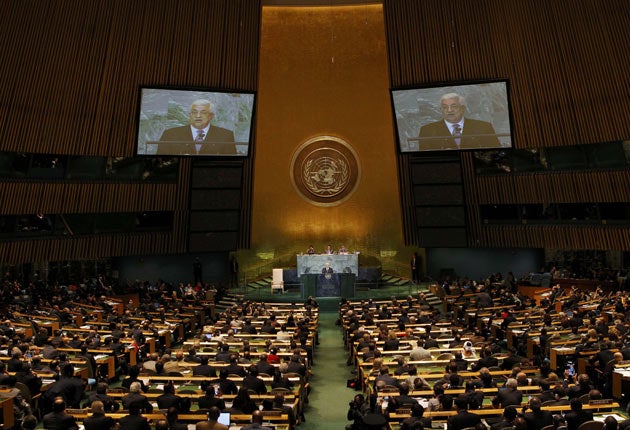Your support helps us to tell the story
From reproductive rights to climate change to Big Tech, The Independent is on the ground when the story is developing. Whether it's investigating the financials of Elon Musk's pro-Trump PAC or producing our latest documentary, 'The A Word', which shines a light on the American women fighting for reproductive rights, we know how important it is to parse out the facts from the messaging.
At such a critical moment in US history, we need reporters on the ground. Your donation allows us to keep sending journalists to speak to both sides of the story.
The Independent is trusted by Americans across the entire political spectrum. And unlike many other quality news outlets, we choose not to lock Americans out of our reporting and analysis with paywalls. We believe quality journalism should be available to everyone, paid for by those who can afford it.
Your support makes all the difference.The Palestinian leader, Mahmoud Abbas, staked his people's claim to full statehood at the United Nations yesterday, in a historic move designed to mobilise international pressure on Israel and outflank the United States, whose sponsorship of the peace process has been unable to deliver the longed-for two-state solution in the Middle East.
The cheers and standing ovation that greeted Mr Abbas's declaration to the General Assembly was a raucous riposte to the US, whose diplomats had worked for weeks to try to head off a Palestinian application for full recognition. But while the application was greeted warmly in the halls of the UN, and with pride among Mr Abbas's supporters on the streets of the Palestinian territories, it is only the first step in a process whose outcome is still far from clear.
The US has vowed to veto Palestinian statehood at the Security Council, and there was last night still no clear timetable for when the council will consider the plan. The US, the UK and other countries still hope to delay consideration for long enough to allow the resumption of peace talks.
Mr Abbas came to the UN, he said, to declare "after 63 years of suffering of an ongoing tragedy: enough, enough, enough. It is time for the Palestinian people to gain their freedom and their independence... We have one goal: to be. And we shall be."
He warned that the lack of progress in peace talks, plus the continued presence of Israeli settlements in the occupied territories, could scupper the Palestinian Authority of which he is president, robbing the Israelis of a viable partner in peace.
"Our people will continue their popular, peaceful resistance," Mr Abbas said. "This (Israeli settlement) policy will destroy the chances of achieving a two-state solution and... threatens to undermine the structure of the Palestinian National Authority and even end its existence." Thousands of Palestinians thronged around outdoor television screens across the West Bank to watch their president submit his request for recognition to the UN Secretary-General, Ban Ki-moon.
Soon afterwards, Benjamin Netanyahu, the Israeli Prime Minister, followed Mr Abbas to the podium to argue that only direct negotiations can bring peace. Underscoring tensions in the region, a 35-year-old Palestinian man was shot dead yesterday in a clash with Israeli soldiers and settlers in the West Bank.
Hamas rejected Mr Abbas' move as "begging" for statehood. The head of Hamas in Gaza said statehood comes from liberation not UN resolutions.
Where they stand
Mahmoud Abbas
The Palestinian leader appears so far to have been one of the few winners in the statehood talks, drawing attention to his people's battle for recognition when it was slipping down the world agenda. His refusal to give in to fierce US pressure to drop the statehood bid has also bolstered his reputation at home.
Benjamin Netanyahu
While Israel's Prime Minister may regard this week's manoeuvrings at the UN as a triumph of US-Israeli ties, he has won few friends on the world stage with his steadfast opposition to any upgrade of the Palestinians' status. Domestically, he is under fire for failing to come up with an initiative of his own.
David Cameron
Performing a canny feat of fence-sitting, the British delegation has so far not revealed how it will vote on statehood, but diplomats say that Mr Cameron appears to be yielding to pressure from the US to abstain on any proposed status upgrade for the Palestinians.
Barack Obama
The White House failed to convince Mr Abbas not to take his bid to the UN to avoid the bind that President Obama now finds himself in. Hawks at home accuse Mr Obama of cosying up to the Palestinians, and the Muslim world is railing against what they see as Washington's continued blind support for Israel.

Join our commenting forum
Join thought-provoking conversations, follow other Independent readers and see their replies
Comments